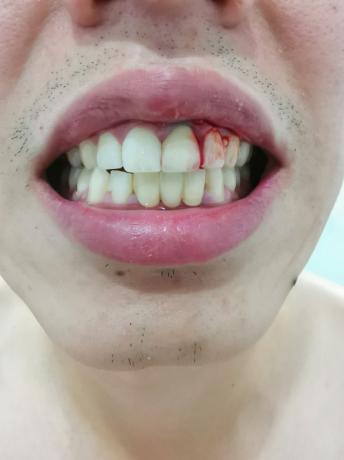O scurvy it's a disease that can cause hemorrhages gums, scarring problems and joint pain. caused by the deficiency of Vitamin C in the body, this disease can be prevented with a diet that provides adequate amounts of this Vitamin. Although the severe stage of the disease is considered rare nowadays, the moderate form can be seen in people with low vitamin C intake.
Read more: Importance of vitamins - fruits, vegetables and vegetables are vitamin-rich foods
What is scurvy?
Scurvy is a disease caused by vitamin C deficiency, which can be obtained through the ingestion of various foods, such as fruits citrus fruits. Scurvy occurs little nowadays, however, at the time of great navigations, the disease was responsible for the death of a large number of sailors, the peak of its incidence being between the 16th and 17th centuries.
This happened because these people spent long periods at sea and did not have fresh food, which caused hypovitaminosis C. It is estimated that Vasco da Gama has lost two-thirds of its crew for the disease when he made his first trip to India.

At first, the causes of scurvy were not known and many believed that it was an infectious disease, since it affected, for example, several sailors on their long voyages. Over time, however, it was understood that this was a nutritional problem.
James Lind was the physician responsible for this discovery, in the year 1747. He divided the sailors who showed symptoms of the disease into groups and provided each group with a different diet. The doctor then realized that those who ate citrus fruits were cured of the disease, making it possible to relate the nutritional deficiency to scurvy.
Do not stop now... There's more after the advertising ;)
Why does lack of vitamin C cause scurvy?
Vitamin C plays different roles in the human body, with emphasis on its action in the synthesis of collagen, one protein that guarantees the resistance of the connective tissues. Vitamin C deficiency consequently causes a deficiency in collagen production, which will trigger processes such as difficulty in regeneration of connective tissues and their weakening.
The vast majority of clinical manifestations of scurvy can be explained by inadequate production of the collagen molecule. Vitamin C deficiency can be noticed with the appearance of symptoms, such as the appearance of small red spots on the skin due to damage to the capillaries (petechiae), bleeding gums, joint pain, poor wound healing, dizziness and fatigue.
Read more: Hypovitaminosis - name given to diseases proven by lack of vitamins
What are the symptoms of scurvy?
Scurvy initially presents a series of nonspecific symptoms, such as malaise and fatigue. As the disease progresses, other symptoms arise, such as muscle and bone pain, small red spots on the skin, bleeding gums, swelling in the lower limbs, difficulty in healing wounds, irritability and depression. In more severe cases, the disease can cause tooth loss, generalized edema, spontaneous bleeding, infections and death.

Is scurvy treated?
Scurvy is a treatable disease based on vitamin C supplementation. Each case must be analyzed by a physician, however, it usually starts with a supplementation with higher doses of vitamin C, and this supplementation is reduced over the weeks of treatment. In general, in the first two weeks, it is already possible to notice improvements, for example, in bleeding lesions on the gums. In about three months, the patient is recovered.
How to prevent scurvy?
Scurvy can be prevented by maintaining adequate vitamin C levels. For this, you must have a balanced diet and that includes foods that contain this vitamin, such as orange, lemon, acerola, broccoli, cauliflower, guava and cashews. According to the Ministry of Health, "the amount of vitamin C needed to prevent deficiency and its specific diseases in humans, such as scurvy, is around 10 mg/day."
Also according to data from the ministry, a serving of fruit provides, on average, 30 mg of vitamin C. This means that maintaining adequate levels of this vitamin may not be such a difficult task.
It is noteworthy that, although the vitamin triggers a series of benefits for our body, its excessive consumption is related to problems such as kidney stones and diarrhea. How vitamin C is related to the facilitation of intestinal absorption of iron, its excess can also cause an excessive absorption of this mineral salt.
By Vanessa Sardinha dos Santos
Biology teacher


